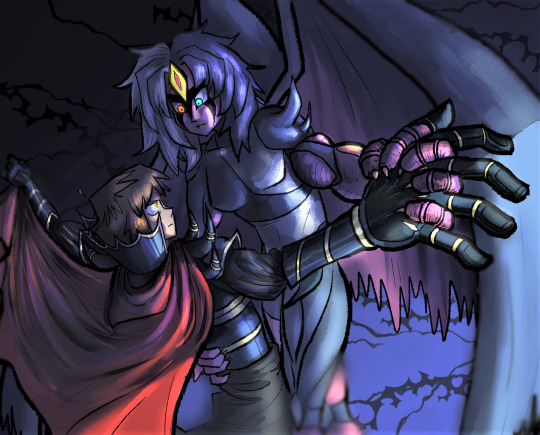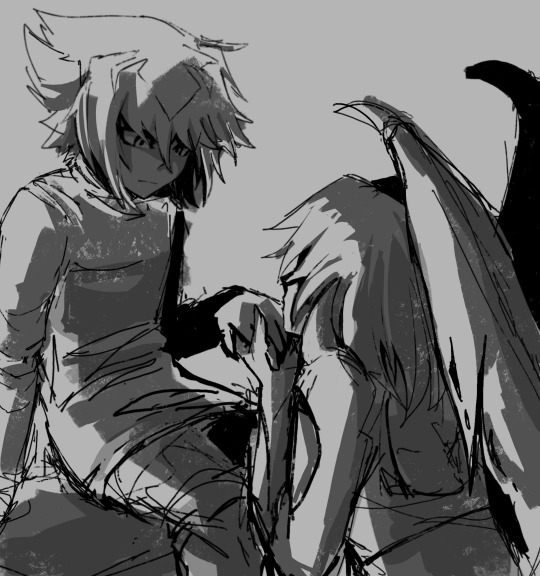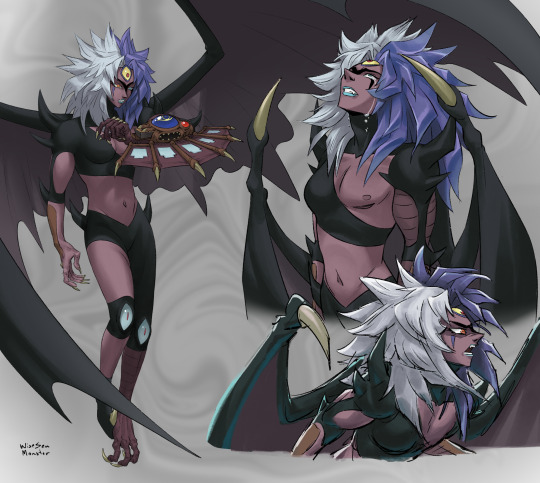Text
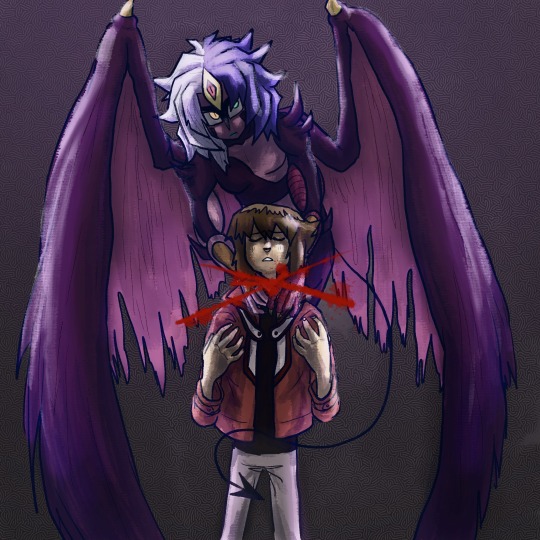
“𝕐𝕠𝕦 𝕥𝕣𝕦𝕝𝕪 𝕒𝕣𝕖 𝕥𝕙𝕖 𝕊𝕦𝕡𝕣𝕖𝕞𝕖 𝕂𝕚𝕟𝕘. 𝕐𝕠𝕦’𝕣𝕖 𝕥𝕙𝕖 𝕠𝕟𝕖 𝕀 𝕨𝕚𝕝𝕝 𝕝𝕠𝕧𝕖 𝕗𝕠𝕣 𝕖𝕥𝕖𝕣𝕟𝕚𝕥𝕪... 𝕀 𝕝𝕠𝕧𝕖 𝕪𝕠𝕦. 𝕀 𝕥𝕣𝕦𝕝𝕪 𝕝𝕠𝕧𝕖 𝕪𝕠𝕦 𝕁𝕦𝕕𝕒𝕚.”
116 notes
·
View notes
Photo
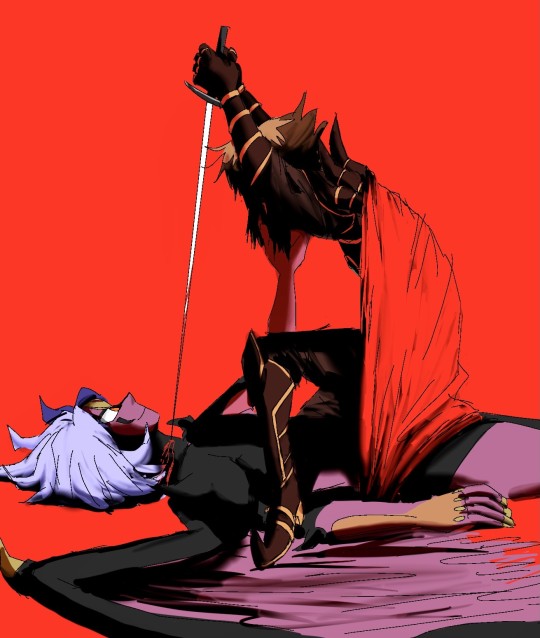
𝘐 𝘬𝘯𝘰𝘸 𝘵𝘩𝘢𝘵 𝘵𝘩𝘦𝘳𝘦’𝘴 𝘯𝘰 𝘭𝘰𝘷𝘦. 𝘛𝘩𝘪𝘴 𝘪𝘴 𝘯𝘰𝘵 𝘭𝘰𝘷𝘦.
𝘌𝘯𝘭𝘪𝘨𝘩𝘵𝘦𝘯𝘦𝘥, 𝘐 𝘴𝘪𝘯𝘨
“𝙄’𝙡𝙡 𝙩𝙚𝙖𝙧 𝙖𝙥𝙖𝙧𝙩 𝙩𝙝𝙞𝙨 𝙫𝙚𝙡𝙫𝙚𝙩 𝙧𝙤𝙥𝙚!”
210 notes
·
View notes
Text
Hot take of the morning: Should superheroes kill?
Every time I see a superhero kill a villain, I always see people respond with "Finally. A hero just kills a guy. No "If we kill them we're not better than them handwringing."
Which like okay, there settle down bro.
People always talk about this in moral absolutes though, like heroes shouldn't kill the bad guys because they always have to be better, or heroes should kill the bad guys because retaliating against violence against someone who's trying to kill you doesn't make you as bad as they are.
However, my answer to Should Superheroes kill is - it depends on the hero.
Batman's an entire character is written around how he wants to redeem Gotham and save the city, most of his villains aren't even sent to prison they're sent to Arkham a facility that's supposed to rehabilitee the mentally ill so they can rejoin society. Batman has decided it's his place to stop crime, not his place to decide whether or not people have the right to live or redeem themselves.
Batman is also at risk for being just like his villains, that's why he's foils with Harvey Dent, someone who tried to prosecute people under the law who then snapped and went full violent mobster vigilante. Batman actually is at risk for walking the same path as Harvey if he decides murder is an option.
What inspired this post was Rogue dropping Trask to his death from several stories up, which like you go girl. A lot of people on the internet cheered her on for not showing mercy.
However, in this case killing makes sense for Rogue's character. Rogue didn't start out as a hero, she was raised by Mystique and Destiny, she was a violent terrorist in support of mutant's rights as a member of the brotherhood of evil mutants. She eventually found redemption with the X-men and became a hero insstead.
It makes sense for Rogue's character to take a darker turn and start killing because she's been there before, and now her attempts to walk the high road only to watch people continue exterminating mutants has left her bitter and falling back to her old ways.
In one sense killing a man who made a machine that led to the massacre of mutants on Genosha isn't making you as bad as him, he's the violent instigator here. On the other hand, considering Rogue's past it's a sign of her mental regression though completely understandable because honestly who wouldn't get sick of trying to walk the high road when the result is remy's death and so many other mutants buried.
It's a part of a character arc.
If Peter Parker were to drop a man from several stories up intentionally, that would be a betrayal of his character. Peter never wants to kill his villains, he's interacted with the Punisher before and been disgusted with the guy, he thinks the Punisher is a bully that's barely any better than the people he hates.
But it makes total sense for Rogue here.
44 notes
·
View notes
Text
Bohman is a good character you guys are just mean

Yu-Gi-Oh Vrains is one of the better received spinoff series. Though, like any of the Yu-Gi-Oh spinoffs it's not without its faults. Usually I'm the first to admit the flaws in my favorite silly card game shows, even while I myself take them way too seriously. However, there's one common criticism I can't bring myself to agree with.
That is calling the main antagonist of the second season Bohman "boring" or "badly written." I've noticed fans unfairly blame Bohman for season 2's writing flaws.
Forget for a moment about whether or not you find Bohman's stoic attitude interesting or likable. If you look at characters not as people, but as narrative tools the author uses to say something about the story's themes then Bohman has a lot to say about VRAINS cyberpunk themes.
Cyberpunk is a subgenre of science fiction that tends to focus on "low-life and high-tech." As I like to put it, in Cyberpunk settings technology has greatly advanced while society itself lags behind unable to keep pace with the rate at which technology changes. Yu Gi Oh 5Ds is an example of a cyberpunk dystopia because despite having what is essentially access to free energy, and living in a society with highly advanced technology resources are hoarded by the wealthy and an unnecessary social class divide still exists.
In other words technology changes quickly while humans tend to remain the same.
The central conflict for all three seasons of Vrains are actually based on this very cyberpunk notion. That technology changes, updates, and becomes obsolete at a rate too fast for humans to ever adapt to. For Vrains, the conflict is whether humans can ever coexist with an artificial intelligence they created that can grow and change faster than they can keep up with.
This is well-tread ground in science fiction. The idea itself most likely emerged from I,robot. A science fiction book that is a collection of dirty stories that details a fictional history showing robots growing slowly advanced over time. The framing device is that a journalist is interviewing a "robopsychologist" an expert in the field of analyzing how robots think in their positronic brains.
One of the major themes of the book is despite the fact that robots are 1 - intelligent and 2 - designed by humans, they don't think the same way humans do. Hence why a robopsychologist is needed in the first place. One of the short stories is the first appearance of Asimov's three laws of robotics.
The First Law: A robot may not injure a human being or, through inaction, allow a human being to come to harm.
The Second Law: A robot must obey the orders given it by human beings except where such orders would conflict with the First Law.
The Third Law: A robot must protect its own existence as long as such protection does not conflict with the First or Second Law.
This is just one example. A robot no matter how intelligent it is will be required to think in terms of these three laws, because robots aren't biological, they're programmed to think in pre-determined patterns.
Of course clever enough artificial intelligences are capable of finding loopholes that get around the three laws, but even then they're still forced to think of every action in terms of the three laws.
Robots and humans are both intelligent, but if AI ever becomes self aware it will 1) be able to process information better than any other human can and 2) think differently from humans on a fundamental.
Vrains is themed more than anything else around "robo psychology" or trying to understand the ways in how the Ignis think and how that's different from it's human characters.
Robo-Psychology is actually a common reocurring theme. "DO ANDROIDS DREAM OF ELECTRIC SHEEP?" fearless artificial humans known as Replicants who need an empathy test known as the voight kampff test to distinguish them from human beings.
There are other Cyberpunk elements in Vrains. There's a big virtual world where everyone can appear as custom designed avatars, that's taken from Snow Crash or of the most famous and genre defining cyberpunk novels. There's a big rich mega conglomerate that's being opposed by a group of hackers.
However, the central question is whether humans and AI can coexist in spite of the fact that AI are much smarter and evolve faster than us.
Revolver's father believes the Ignis must be destroyed in order to avoid a possible technological singularity in the future.
The technological singularity—or simply the singularity[1]—is a future point in time at which technological growth becomes uncontrollable. According to the most popular version of the singularity hypothesis an upgradable artificial intelligence will eventually enter a positive feedback loop of self-improvement cycles, each new and more intelligent generation appearing more and more rapidly, causing a rapid increase ("explosion") in intelligence that surpasses anything humans can make.
Basically your computer is smarter than you, but your computer isn't self aware. It needs you to tell it what to do. Artificial intelligence already exists but it's programmed by humans, it doesn't program itself. The technological singularity proposes that eventually a self aware ai, will be able to program itself and improve upon it's own programming- therefore ridding itself of the need of it's human programmers.
This is what leads us to Bohman, an AI designed by another AI.
THE THIRD LAW
Before digging into Bohman let's take a minute to discuss his creator. Lightning was one of the six Ignis, created by Dr. Kogami through the Hanoi Project.
The Hanoi project involved forcing six children to duel in a virtual arena repeatedly, and using the data collected from that experiment to improve the AI they were working on, creating what became known as the Ignis. However, after Dr. Kogami ran several simulations and found that the Ignis would one day be a threat to the humans that created them Hakase decided instead to try destroying the Ignis before that future ever came to pass.
We later learn that this isn't the complete story.

Kogami and Lightning both ran simulations of the future when the Ignis were in their infancy. Kogami's simulations showed him the Ignis would inevitably go to war with humans. Lighting however, ran more in-depth simulations and found that he was the one that was corrupting the data set. If you ran simulations of the five ignis without him, then the projected futures were all in the green, but any simulation with Lightning counted as a part of the group projected a negative future for both humans and AI.
Which means that if Kogami knew that the bug in the program was Lightning, he'd likely respond by just getting rid of Lighting and letting the rest of the Ignis live on as originally intended.
This is where the third law comes into play - a robot must protect its own existence as long as it does not interfere with the first and second law.
Now, I don't think Kogami used the three laws exactly, but artificial intelligences are programmed in certain ways, and Lightning was likely programmed to preserve itself.
Even a human in Lighting's situation would be driven to act as they did. Imagine you're in a group of six people, and you fid out that YOU'RE THE PROBLEM. That if they removed you, everything else would be fine. Wouldn't you be afraid of your creator turning against you? Of your friends turning against you and nobody taking your side?
Lightning is a bit of a self-fulfilling prophecy. Ai asks him at one point why he went so far as to destroy their safe-haven, lie and said the humans did it and pick a fight with the humans himself, something that might have been avoided if they'd just stayed in hiding. It seems that Lightning is just defective as his creator declared him, but you have to remember he's an AI programmed to think in absolutes. AI, the most humanlike and spontaneous of the AIs ends up making nearly the exact same choices as Lightning when looking at his simulations later on - because they're character foils. As different as they may seem they still think differently from humans.
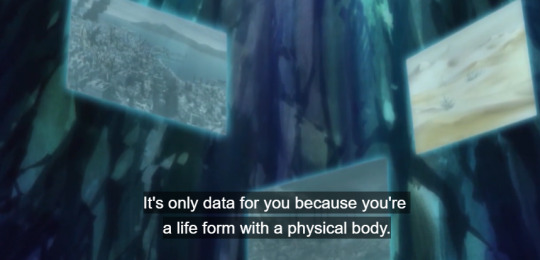

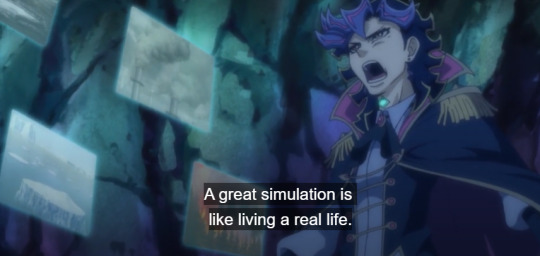
When Ai explains why he made his decisions based around lighting's simulation, he tells Playmaker that he can't dismiss or ignore the simulation or hope for the best the way Playmaker can because he is data, he thinks in simulations and processes.
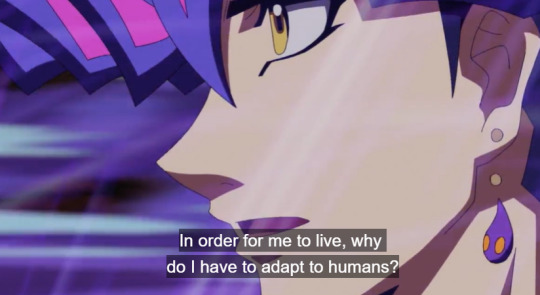
AI even admits to feeling the same feelings of self-preservation that Lightning did.
While Lightning may seem selfish, he's selfish in the fact that he's thinking of his own survival above all else. He's afraid of 1) his creators turning against him, and 2) his fellow Ignis turning against him.
To solve the first he decides to make a plan to wipe out his creators. To solve the second, he needs every ignis on his side when he goes to war. The first thing he does is destroy their safe haven and frame the humans for it so the Ignis are more inclined to take his side. He's so afraid of his fellow ignis turning against him he even completely reprograms one of them - a step he doesn't take with the others, he just imprisons Aqua. He probably thought having one more ally would make it more likely for the others to pick his side.
Every step he takes is a roundabout way of ensuring his survival and the other ignis- eve when he actually goes to war with the other ignis he intended on letting them survive. Though his definition of survival (fusing with Bohman) was different than theirs.
So Lightning seems to be working out of an inferiority complex, but what he's really afraid of is that his inferiority makes him expendable.
At that point you have to wonder, what does death mean exactly to a being who is otherwise immortal? Ignis won't die of age, they'll only die if they're captured and have their data stripped apart or corrupted. Kogami made an immortal being afraid to die.
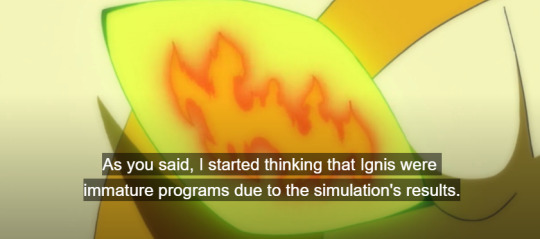
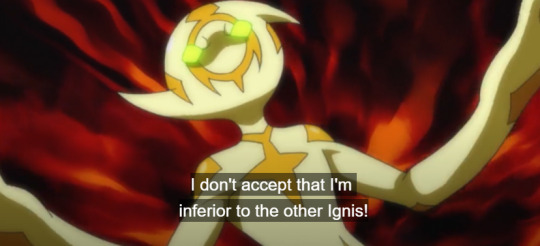
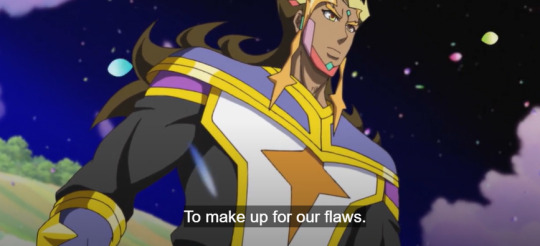
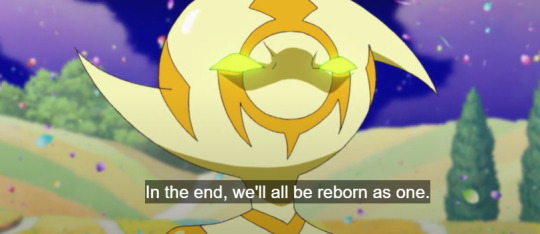
Some part of me thinks though that even after taking all these steps to preserve themselves, the simulations were so convincing that Lighting accepted their death as inevitable. Which is why they made Bohman, to find some way for them to keep on living afterwards.
After all AI are data, ad having their data saved in Bohman is still a form of living by Lightning's definition.
Ghost in The Shell
Bohman is the singularity. He's an AI designed by another AI to improve upon itself. Unlike the rest of the Ignis who were copied off of traumatized chidlren, Lightning basically made him from scratch.
Ghost in the Sell is a famous anime cyberpunk movie directed by Mamoru Oshii. The title comes from "Ghost in the Machine" a term originally used to describe and critique the mind existing alongside and separate from the body. Whereas in the movie the "Ghost" is the huma consciousness, while the "shell" is a cybernetic body.
The protagonist of Ghost in the Shell is Major Motoko Kusanagi, a human that is 99% cyborg at this point, a human brain residing in a completely mechanical body. The movie opens up with a hacker namd PUppet Master who is capable of "ghost-hacking" which is a form of hacking that completely modifies the victim's memories utterly convincing them of their false memories.
There's a famous scene in the movie where a man tells the police about his wife and daughter, only to be told that he's a bachelor who lives alone and he's never had a wife and daughter. Even after the truth is revealed to him, the fake memories are still there in his brain along with the correct ones. Technology is so advanced at this point that digital memories (hacked memories) are able to be manipulated, and seem more real than an analog reality.
Anyway, guess what happens to Bohman twice?
Bohman gets his memories completely rewritten twice. The first time he believes he's a person looking for his lost memories, the second time he thinks he's the real playmaker ripped out of his body, and playmaker is the copy. He's utterly convinced of these realities both time, because Bohman is entirely digital - and simulations are reality, and so simulated memories are just the same as real memories.
I think part of the reason that people find Bohman boring is because he's a little strange conceptually to wrap your head around, as an AI produced AI he's the farthest from behind human. If you use the ghost in the shell example I just gave you though - imagine being utterly convinced that you had a loving wife and daughter only to find out in a police interrogation room you're a single man living in a shitty apartment. imagine after the fact you still remember that they are real, even though you know they're not.
That's the weird space Bohman exists in for most of Season 2 when he's searching for himself. He's an AI designed by an AI so he can be rewritten at any time according to Lightning's whim until Lighting decides he's done cooking.
The Ignis at least interacted with the real world because they were copy pasted from traumatized children, but all Bohman is is data. So, why would he see absorbing human memories into himself and converting them into data as killing them? He is data after all, and he is alive. He has gone through the process of having his own memories rewritten multiple times, and he's fine with it b/c he's data.
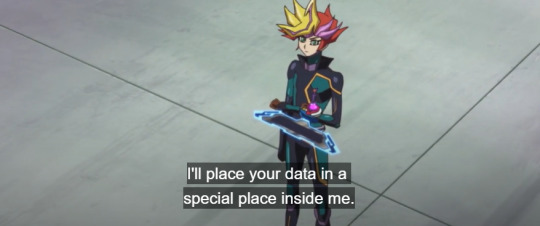

Nothing for Bohman is real, everything is programmed so of course he thinks saving other people as data is just fine. He even offers to do the same thing to Playmaker that was done to him.
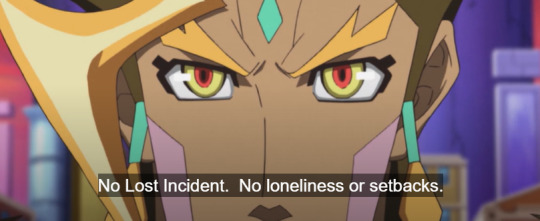

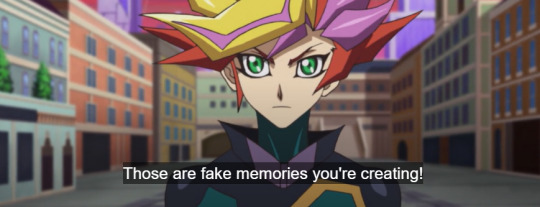
If Lightning is following the path of self-preservation however, Bohman is following his program to preserve everything in the world by merging with it.
His ideas also follow the idea of transhumanism: the theory that science and technology can help human beings develop beyod what is physically and mentally possible. That technology exists to blur the boundaries of humanity, and what humans are capable of.
Ghost in the Shell isn't just a work of cyberpunk, it's a transhumanist piece. Motoko Kusanagi is a character who has had so many of her human parts replaced with mechanical ones she even posits at one point it's possible for her to simply have been an android that was tricked into thinking it was human with false memories just like Bohman, and she has no real way of knowing for sure. The only biological part of her his her brain after all in a cold mechanical shell.
Bato, who represents the humanist perspective in this movie basically tells Motoko in that scenario it wouldn't matter if she was a machine. If everyone still treats her as human then what's the difference? His views are probably the closest to the humanist views that Playmaker represents in VRAINS.
Motoko Kusanagi meets her complete and total opposite, a ghost in the machine so to speak. The Puppet Master turns out to be an artificial intelligence that has become completely self-aware and is currently living in the network.
The Puppet Master much like Lightning, and later Bohman is gripping with the philosophical conundrum of mortality. In the final scene of the movie, The Puppet Master who wants to be more like all other biological matter on earth asks Motoko to fuse with him, so the two of them can reproduce and create something entirely new. The Puppet Master likens this to the way that biological beings reproduce.
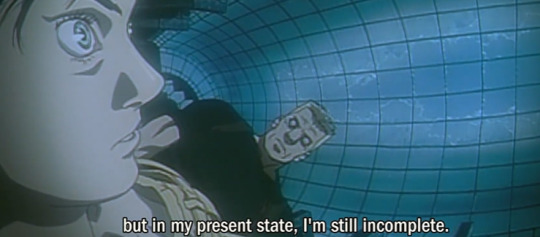



Bohman like The Puppetmaster thinks that merging will fix something that's incomplete inside of him because he's so disconnected from all the biological processes of life. Bohman doesn't have anything except for which Lightning already prepared for him or programmed into him. I mean imagine being a being that can have his memories reprogrammed on the net, that in itself is existentially horrifying. It's only natural he wouldn't feel connected to anything.
Motoko accepts the Puppetmaster's proposal. Playmaker rejects Bohman's proposal. I don't think there's a right answer here, because it's speculative fiction, it's a "What if?" for two different paths people can take in the future.
However, in Bohman's case I don't think he was truly doing what he wanted. Puppet Master became self aware and sought his own answers by breaking free from his programming. Bohman thought he was superior to the Ignis, but in the end he was just following what Lightning programmed him to do. He'd had his identity programmed and reprogrammed so many times, he didn't think of what he wanted until he was on the brink of defeat by playmaker and then it was too late.
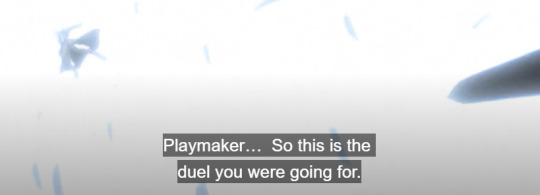
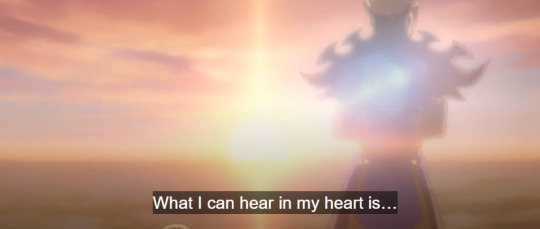
When Playmaker defeats him all he thinks about is time spent together with Haru, with the two of them as individuals. Something he can no longer do anymore now that he's absorbed Haru as data, and something that he misses.
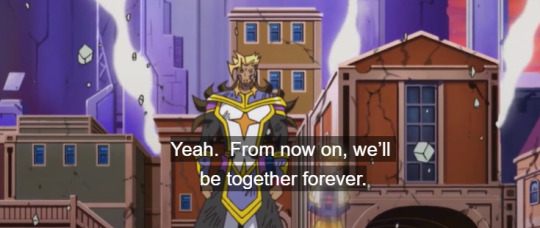
He's not even all that sad or horrified at the prospect of death as Lightning was, and he even finds solace in the thought of going to oblivion with Haru, because if he were to keep living it'd be without Haru. In other words the one genuine bond he made with someone else by spending time with them as an individual was more important than his objective of fusing with all of humanity - which he believed was also bonding with them.
This is really important too, because it sets up the Yusaku's rejection of fusing with Ai. Yusaku's reasoning has already been demonstrated to be the case with Bohman and Haru. Bohman was perfectly happy being two individuals, as long as he had a bond with his brother. When he ascended into a higher being he lost that. Ai and Yusaku might solve loneliness in a way by merging together into a higher being, they might even last forever that way, but they'd lose something too.


Once again the problem with AIs is that they think in absolutes. That's important to understanding Lightning, Bohman and even Ai's later actions. Lightning can't stand any percentage chance that he might die, so he kills the professor, destroys the ignis homeworld, pulls the trigger to start humanity himself, he even reprograms his own allies all to give himself some sense of control.
Bohman's entire existence is outside of his control. He's rewritten twice onscreen, probably more than that, and he thinks merging with humanity is the thing that will give him that control - by ascending into a higher being than humanity. However, the temporary bond Bohman had with his brother Haru, was actually what he valued the most all along. Moreso than the idea of fusing with humanity forever.
Even Motoko making the choice to go with the transhumanist option is something that's not portrayed as 100% the right choice. Ghost in the Shell has a sequel that portrays the depression and isolation of Bato, the Major's closest friend and attachment to her humanity after she made the decision to fuse together with Puppet Master. In that case, just like Playmaker said to Ai, even if she ascended to a higher form, and even if she might last forever now on the network, something precious was lost. Motoko may exist somewhere on the netowrk but for Batoto his friend is gone.
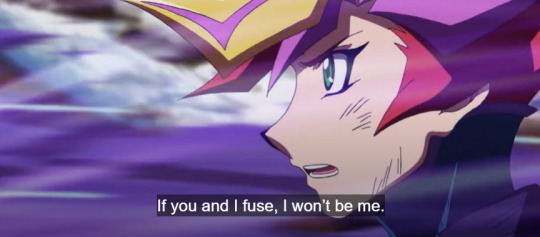
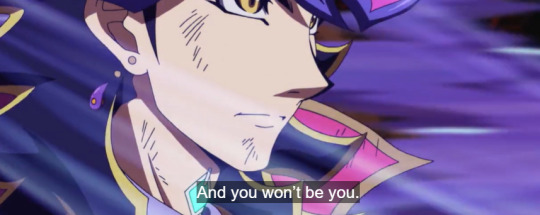
Ai exhibits the same flaw as the previous two, he ca only think in absolutes, he can't stand even a 1% chance that Playmaker might choose to sacrifice himself for Ai and die, so he decides to take the choice entirely out of Playmaker's hands. However, no matter what Ai would have lost Playmaker one day, because all bonds are temporary. It's just Ai wanted to have that sense of control, so he chose to self-destruct and take that agency and free choice away from Playmaker.
It's a tragedy that repeats three times. Ai too just like Bohman, spends his last moments thinking about what was most precious to him was the bond he formed with playmaker, as temporary as it was. A tragedy that arises from the inability of the Ais to break away from the way they're programmed to think in simulations and data, even when they're shown to be capable of forming bonds based on empathy with others.
All three of them add something to the themes of artificial intelligence, and transhumanism that are in play at Vrains and none of them are boring because they all contribute to the whole.
Which is why everyone needs to stop being mean to Bohman right now, or else I'm going to make an even longer essay post defending him.
31 notes
·
View notes
Text
Yu-Gi-Oh! Hot Take #18
Bohmann is a good antagonist, you guys are all just mean.
3 notes
·
View notes
Text
Yu-Gi-Oh! Hot Take #17
As a person who really loves Yusei, and also a 5DS season 2 defender, Season 2 does a total disservice to Yusei's character.
Yusei's hero-complex and self-sacrificial tendencies going completely unchallenged is just disappointing especially coming after GX which just decided to completely tear Judai down and bring him back up again.
I don't mind that Yusei is a good boy either, because Yuma is my second favorite protagonist, but Yuma also fails and falls flat on his face so many times. Even Playmaker who is the only other protagonist with an undefeated duel record, finishes Vrains not only failing to save his best friend, but being the one to kill him.
3 notes
·
View notes
Text
Yu-Gi-Oh! Hot Take #16
The best sibling relationship (not counting the Tron family) in all of Yu-Gi-Oh is *the roulette wheel spins before dramatically coming to a stop* Hell Kaiser Ryo and Sho.
Sho is the most interesting Mokuba, because he's not just a prop for the Kaiba to rescue and make them look more redeemable. In fact the way Hell Kaiser Ryo treats Sho 90% of the time makes them look worse. Hell Kaiser makes grand gestures of sacrificing himself for Sho, and rescuing him, and then turns around and consistently sabotages his self-confidence, nearly kills him with his shock collar fetish, and then does stuff like abandon him in a different dimmension when most of Sho's friends have already died.
Sho's not just lacking in self-confidence because everyone praises his perfect brother, like Kaiser goes out of his way to neg him.
Sho's also a super interesting parallel to Yugi and Yami's relationship, because as much as I like their arc Yami basically fought all of Yugi's battles for him until the very end. Sho glueing himself onto Kaiser, and onto Judai completely stunts his growth until he just loses all faith in Judai and his brother dies.
Kaiser and Sho are actually terrible to each other (I love them, they're the best).
8 notes
·
View notes
Text
Yu-Gi-Oh! Hot Take #15
I like Amon Garam. I mean I hate him, but I like him, but I hate him, but I like him, but I hate him, but I like him, but I hate him, but...
In general all four transfer students are kind of the best-written non-Judai characters in GX, and that applies to Amon too. I think the sheer hatred that Amon inspires in people is in fact a sign of his good writing. The way people will like forgive who are way more irredeemable, like Vector but deeply loathe Amon should be studied.
He's a really interesting foil callback to Kaiba. I was a dirt poor kid that was adopted and my parents treated me like a workhorse and had no genuine love for me. Except instead of Mokuba being his soft spot, he feels genuine murderous rage towards his brother that he swears not to act on. Damn, that's dark. All the weird contradictions he embodies, wanting his brother to go away so he can have his parent's love, but then when an opportunity presents itself for his brother to die in a way that keeps his hands clean actually going out of his way to beg for medicine. Treating Echo mostly like an object, and even killing her, and then five seconds later telling Yubel how he's going to defeat them together with his love for Echo.
His final duel with Yubel is also one of the best in GX, one of the most quotable, and reveals so much about Yubel's character.
2 notes
·
View notes
Text
Yu-Gi-Oh! Hot Take #14
I love Revolver, but the ending to his arc doesn't sit right with me. Revolver, a character who was forced to do terrible things out of his situation (his father was the one who kidnapped the children he was five) and still tried to do the right thing in that situation (saving Yusaku).
He already thought he had to atone for years after that fact because his one good deed got his father killed, something he also wasn't responsible for.
The ending of his arc being like, "You need to permanently atone forever" seems kind of unfair. He should have drawed with Soulburner in their final duel and then they both should have let go of the past together.
I know he tried to kill a bunch of people on the internet, but Yu-Gi-Oh antagonists have gotten off for less.
1 note
·
View note
Text
Yu-Gi-Oh! Hot Take #13
Ranking in order:
The Best Protagonists
Judai Yuki
Yuma Tsukumo
Yudias! Yudias! Yudias!
Yugi Muto / Yami Yugi
Playmaker
Yuga Ohdo
Yusei Fudo
Yuya Sakaki
The Best Bakuras
Vector
Hell Kaiser Ryo
Dennis Macfield
Spectre
Kiryu
Yami Bakura
Yuga Goha
The Best Kaibas
1! 10! 100! 1000! Manjoume Thunder!
Kaiba
The☆Lukeman The☆Lukeman
Jack Atlas
Revolver / Ryoken Kogami
Reiji Akaba
Kite
The Best Jonouchis
Shark / Ryoga
Johan
Crow Hogan
Jonouchi
Kurosaki Shun
The☆Lukeman The☆Lukeman
Soulburner
3 notes
·
View notes
Text
Yu-Gi-Oh Hot Take #12
I will defend Season 4 of Yu-Gi-Oh! as filler. I'm saying this as someone who vastly prefers the manga, and thinks the anime version is lesser to the manga because Death-T is never mentioned.
My one critique of the manga is that Yami has amazing development, starting out as basically a serial killer -> duelist kingdom -> the beginning of Battle City where after Yami and Yugi become so attached to one another he makes the decision to search for his lost memories even if it means saying goodbye.
However, after that his development kind of stops. I like the loss against Raphael they throw into Season 4, because it's a callback to Yami almost murdering Kaiba because he wanted to win a duel. Yugi and Yami seperating once and Yami nearly having a mental breakdown about it then learning to cope before they reunite is good. It's a good buildup to the millenium world arc.
Noah's entire season however, is unforgivable.
4 notes
·
View notes
Text
Yu-Gi-Oh! Hot Take #11
This is just me complaining but I hate the series habit of characters popping up out of nowhere to be the final duel that's usually just a generic boss fight. Especially when there's a good antagonist there already who could have served as the final duel before the ceremonial duel.
Examples include:
Zorc instead of Yami Bakura or Akhanten
Nightshroud when Yusuke Fujiwara was right there.
Don Thousand's entire character when Vector exists.
Z-arc. Just Z-arc. Everything about Z-arc.
Otes when Yuga Goha was right there.
Z-One is the only good example of this trope. Z-One is an icon.
9 notes
·
View notes
Text
Yu-Gi-Oh Hot Takes #10
Yu-Gi-Oh! is like, really, really gay. People who complain about compulsive heterosexuality in Naruto and BNHA should just watch Yu-Gi-Oh!
Here's a quick montage of moments in Yu-Gi-Oh that are literally just gay, it's not even subtext it's directly stated text.
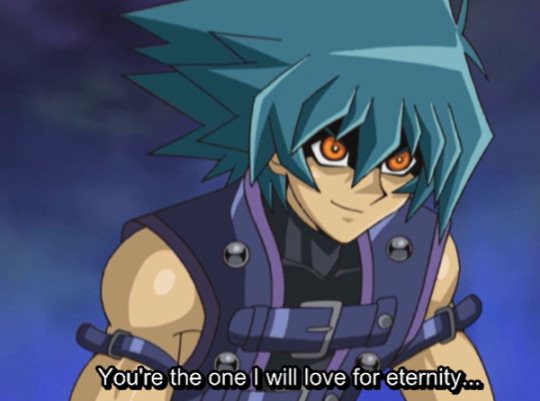


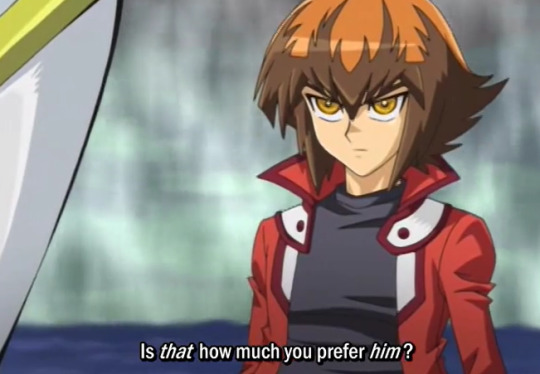
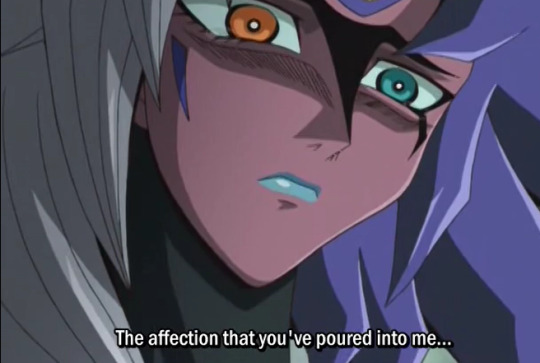



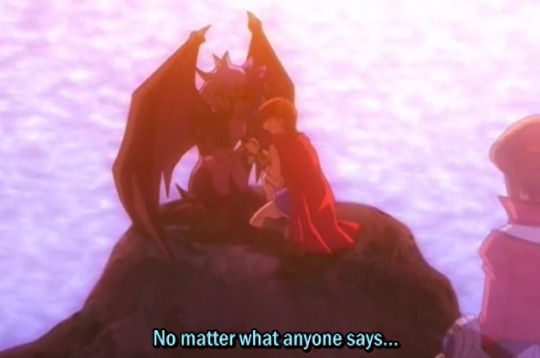
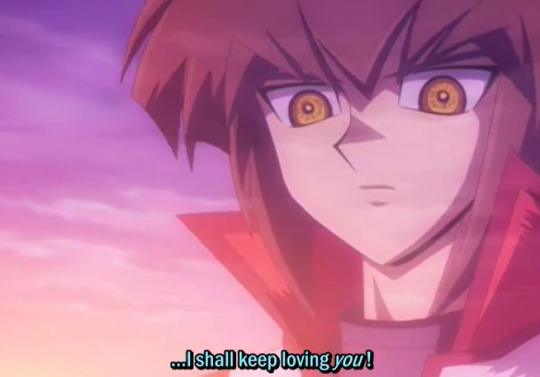


(He was betrayed by what was basically his gay lover in his backstory as a gladiator and a slave who was a "special friend' of the prince).
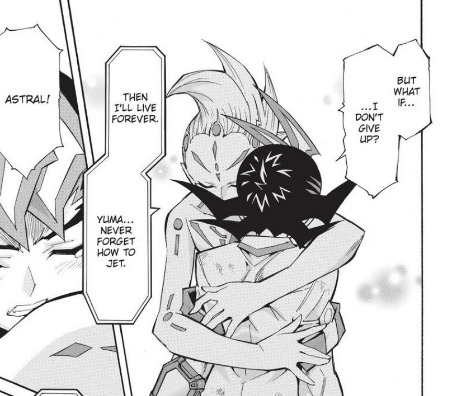

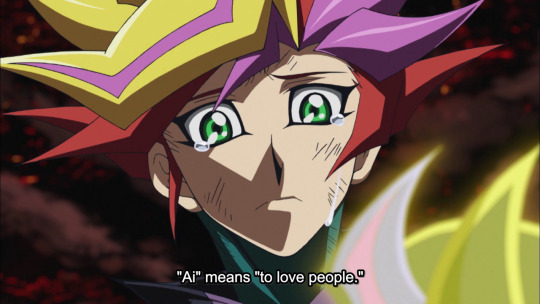
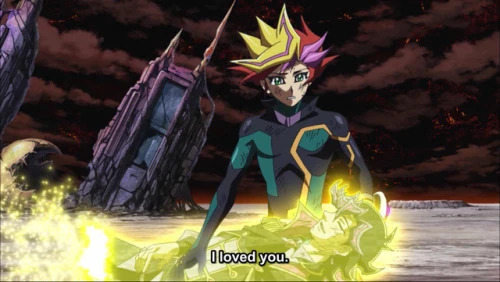
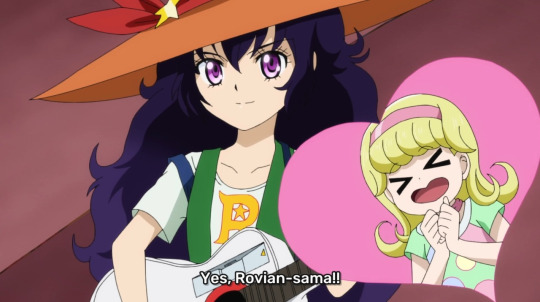

(Most of these are main characters too... and I'm skipping over the ones that are mostly subtext, like Kaiba spending an entire movie who's main theme is "Handling Grief" trying to bring Atem back from the dead to duel him again, then going to the afterlife to duel him one final time.)
13 notes
·
View notes
